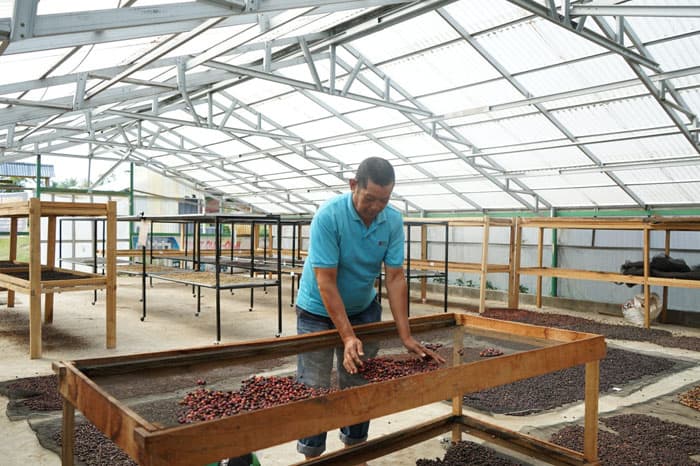WEST SUMATRA — Located at an elevation of 1,300 meters above sea level with a temperature of 16 degrees Celsius, the lands of Nagari Sirukam in Solok Regency are covered with hundreds of thousands of coffee trees of various types. At this altitude, Arabica coffee is most ideally planted.
A group of Solok Sirukam coffee farmers has been thriving in collaboration with Dompet Dhuafa. Established in 2019, this group of 25 farmers successfully formed a cooperative two years later, in 2021.


The growth of this empowerment group is evident in the increase in the number of members, production quantity, production quality, variety, and extensive market reach. Dompet Dhuafa’s empowerment program specifically cultivates Arabica coffee. Among the varieties developed are Gayo, Longberry, and Sigararutang. Outside the empowerment lands, the Sirukam community also cultivates Robusta coffee.
Baca juga: Saat Orang Tua Tak Ingin Anaknya Sengsara Jadi Petani Kopi, Yogi Malah Jadi Barista Pilantrokopi
The group has also built a coffee processing facility covering an area of 60 x 40 square meters. Nasril Abeng is the chairman of the cooperative. The Solok Sirukam Coffee Farmers Group, which initially had 25 members, has grown to 39 members and now to 65 members. Additionally, there are several farmers from neighboring districts currently under mentorship who will soon join.


Back in 2019, the farmers prepared planting holes in their lands, and Dompet Dhuafa provided the initial capital in the form of seedlings. The first planting involved 250 trees. Now, they can harvest 3 tons of coffee cherries per month. These cherries are processed into coffee beans, yielding about 800 Kg.
Abeng explained that the characteristics of Solok Sirukam Arabica, after laboratory tests, include banana, durian, jackfruit, cinnamon, and jasmine. This coffee has even been tested in the Netherlands, scoring 86.
Baca juga: Dompet Dhuafa Launching Pilantrokopi, Coffee Shop di Padang Berbasis Pemberdayaan Dana Filantropi


“The demand from the Netherlands is not significant, so the majority of our market is local, in several coffee houses in Padang, West Sumatra, and Yogyakarta,” he explained on Saturday (14/10/2023).
Currently, Abeng and his fellow group members are experimenting with civet fermentation, supported by students conducting their Community Service Program (KKN) in the area.
“This is just an initial exploration. We hope to achieve good results, making it viable for the market and adding a new variant,” he hoped.



To pick coffee from the trees, farmers need to have a good understanding, especially regarding the ripeness of the cherries. The picking process can affect the taste and quality of the coffee beans. Typically, farmers pick the cherries when they are red. After that, the washing process is carried out. The Solok Sirukam farmers’ group performs this washing process through 5 methods: natural wash, natural enzymatic, full wash, semi-wash, honey, and black honey. (Dompet Dhuafa/Muthohar)



